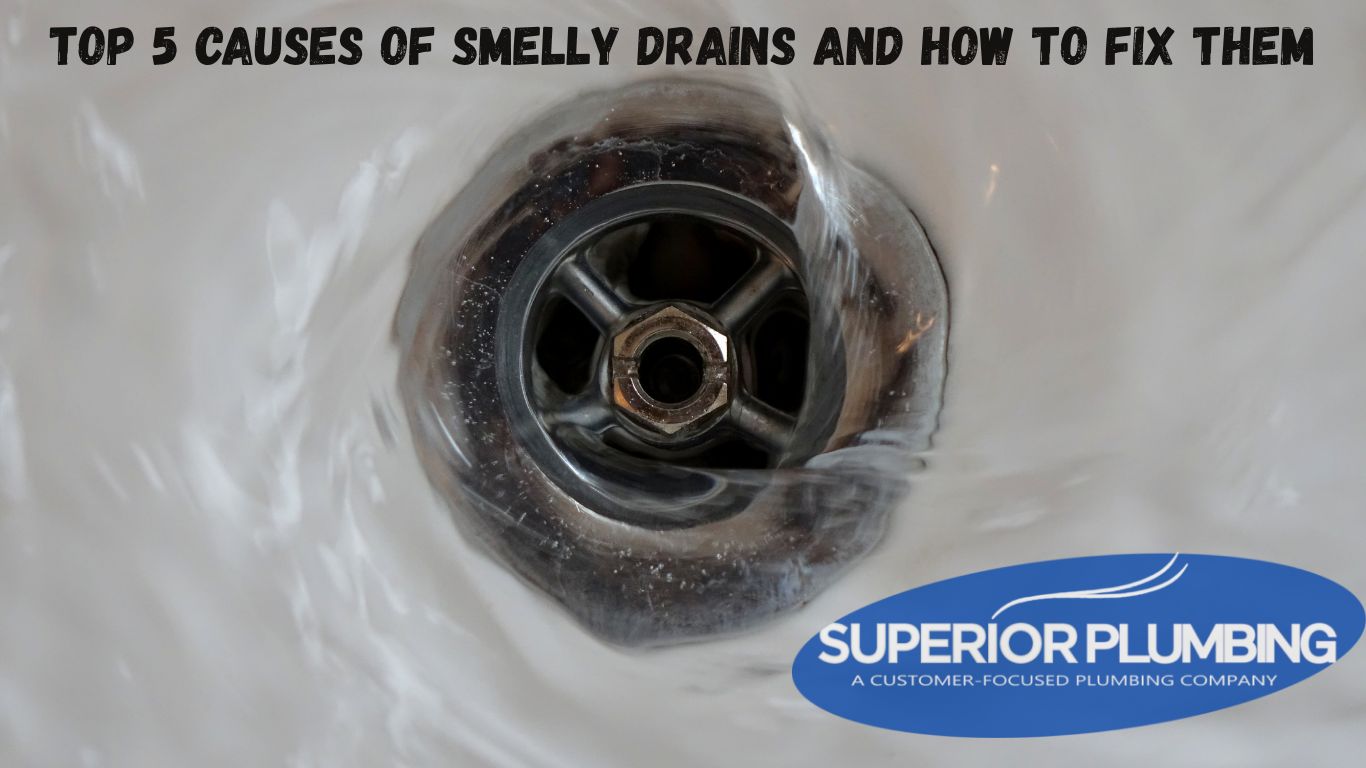There’s nothing quite as unpleasant as walking into your kitchen or bathroom and being hit with that unmistakable odor coming from the sink. Smelly drains are one of the most common plumbing problems homeowners in Burleson face, and they’re more than just a nuisance—they often signal buildup, bacteria, or even deeper issues in your pipes.
The good news? You don’t have to live with the smell. Once you know what’s causing it, you can take the right steps to eliminate the odor and prevent it from coming back. Here are the top five reasons your drains smell bad—and what you can do about each one.
1. Buildup of Food, Grease, or Soap Scum
Over time, food particles, grease, and soap residue can cling to the inside of your pipes. This sticky buildup becomes a breeding ground for bacteria, which release foul odors as they decompose.
You might notice this problem most in your kitchen sink, especially if you cook with oil or rinse food down the drain.

How to Fix It:
Pour a mixture of hot water, baking soda, and vinegar down the drain to help break up buildup naturally. Avoid harsh chemical drain cleaners, as they can corrode your pipes over time. If the smell persists, professional drain cleaning can remove stubborn clogs and restore your plumbing’s freshness.
2. Dry P-Trap
If you catch a strong sewer-like odor, especially from a rarely used sink or floor drain, a dry P-trap might be to blame. The P-trap is a curved section of pipe beneath your drain that holds water to block sewer gases from entering your home. When it dries out, those gases escape freely.
How to Fix It:
Run water down the drain for 30 seconds to refill the trap. If you have unused drains (like in guest bathrooms), run water through them every few weeks to keep the trap wet. For floor drains, you can also add a few drops of mineral oil on top of the water to slow evaporation.
3. Clogged or Dirty Garbage Disposal
Garbage disposals can trap bits of food that rot over time, leading to some seriously smelly drains. Even if you run the disposal regularly, small bits of waste can stick to the blades and sides.
How to Fix It:
Start by turning off the power to the disposal. Then clean it by grinding ice cubes and lemon peels to remove buildup and neutralize odors. For deeper cleaning, sprinkle baking soda into the disposal, pour in vinegar, let it foam for a few minutes, and rinse with hot water.
If smells persist, schedule a professional cleaning or inspection to make sure no components are damaged.
4. Vent Pipe Blockages
Your plumbing system uses vent pipes to equalize air pressure and direct sewer gases safely outside your home. When those pipes become blocked—by debris, leaves, or even small animals—the gases can back up into your drains instead.
How to Fix It:
This issue typically requires a licensed plumber. Professionals can inspect your vents with specialized tools and clear blockages safely. If you’ve noticed multiple drains smelling at once or gurgling sounds from your sink, it’s time to call for expert help.
Superior Plumbing offers leak detection and inspection services to identify vent or pipe blockages before they become bigger problems.
5. Sewer Line Problems
If several drains throughout your home smell bad, especially with a rotten egg or sewage odor, the issue could stem from your main sewer line. Cracked or clogged sewer lines can allow gases and waste to back up into your plumbing system.
Sewer issues are serious and should never be ignored—aside from the smell, they can lead to slow drains, gurgling toilets, and even sewage backups.
How to Fix It:
You’ll need to call a professional plumber for a full inspection. Using video cameras, they can identify the source of the problem and determine whether you need cleaning, repair, or replacement. Learn more about what causes sewer odors and backups from the EPA Sewer Overflow Resource.
Preventing Smelly Drains in the Future
Keeping your drains odor-free isn’t just about reacting to problems—it’s about preventing them. Here are a few simple habits that can make a big difference:
-
Avoid Pouring Grease Down the Drain – It solidifies and traps debris.
-
Run Hot Water After Using the Sink – Helps clear soap and residue.
-
Use Baking Soda Monthly – A natural deodorizer that keeps pipes clean.
-
Clean Your Disposal Regularly – Ice cubes and citrus work wonders.
-
Schedule Routine Maintenance – Professional cleanings keep your system in top shape.
If you notice recurring smells or slow drains, your plumbing may need more than just a quick rinse.
Superior Plumbing Reliably Fights Odors
When it comes to eliminating smelly drains, Burleson homeowners trust Superior Plumbing for reliable, long-lasting results. Their licensed technicians use advanced tools to clear buildup, repair damaged pipes, and ensure your plumbing system flows (and smells) the way it should.
In addition to drain cleaning, they offer sewer drain and full plumbing inspections to prevent future problems.
Real Testimonial
“We had a horrible smell coming from our kitchen sink that we couldn’t get rid of. Superior Plumbing came out the same day, cleaned the drain, and fixed the problem. Our kitchen smells fresh again!” – Laura P.
Freshen Up Your Home Today
Don’t let smelly drains linger and make your home uncomfortable. Whether the cause is simple buildup or a serious plumbing issue, Superior Plumbing has the experience and equipment to make it right.
Call today to schedule a drain inspection and get rid of those odors for good.
2. Dry P-Trap
If you catch a strong sewer-like odor, especially from a rarely used sink or floor drain, a dry P-trap might be to blame. The P-trap is a curved section of pipe beneath your drain that holds water to block sewer gases from entering your home. When it dries out, those gases escape freely.
How to Fix It:
Run water down the drain for 30 seconds to refill the trap. If you have unused drains (like in guest bathrooms), run water through them every few weeks to keep the trap wet. For floor drains, you can also add a few drops of mineral oil on top of the water to slow evaporation.
3. Clogged or Dirty Garbage Disposal
Garbage disposals can trap bits of food that rot over time, leading to some seriously smelly drains. Even if you run the disposal regularly, small bits of waste can stick to the blades and sides.
How to Fix It:
Start by turning off the power to the disposal. Then clean it by grinding ice cubes and lemon peels to remove buildup and neutralize odors. For deeper cleaning, sprinkle baking soda into the disposal, pour in vinegar, let it foam for a few minutes, and rinse with hot water.
If smells persist, schedule a professional cleaning or inspection to make sure no components are damaged.
4. Vent Pipe Blockages
Your plumbing system uses vent pipes to equalize air pressure and direct sewer gases safely outside your home. When those pipes become blocked—by debris, leaves, or even small animals—the gases can back up into your drains instead.
How to Fix It:
This issue typically requires a licensed plumber. Professionals can inspect your vents with specialized tools and clear blockages safely. If you’ve noticed multiple drains smelling at once or gurgling sounds from your sink, it’s time to call for expert help.
Superior Plumbing offers leak detection and inspection services to identify vent or pipe blockages before they become bigger problems.
5. Sewer Line Problems
If several drains throughout your home smell bad, especially with a rotten egg or sewage odor, the issue could stem from your main sewer line. Cracked or clogged sewer lines can allow gases and waste to back up into your plumbing system.
Sewer issues are serious and should never be ignored—aside from the smell, they can lead to slow drains, gurgling toilets, and even sewage backups.
How to Fix It:
You’ll need to call a professional plumber for a full inspection. Using video cameras, they can identify the source of the problem and determine whether you need cleaning, repair, or replacement. Learn more about what causes sewer odors and backups from the EPA Sewer Overflow Resource.
Preventing Smelly Drains in the Future
Keeping your drains odor-free isn’t just about reacting to problems—it’s about preventing them. Here are a few simple habits that can make a big difference:
-
Avoid Pouring Grease Down the Drain – It solidifies and traps debris.
-
Run Hot Water After Using the Sink – Helps clear soap and residue.
-
Use Baking Soda Monthly – A natural deodorizer that keeps pipes clean.
-
Clean Your Disposal Regularly – Ice cubes and citrus work wonders.
-
Schedule Routine Maintenance – Professional cleanings keep your system in top shape.
If you notice recurring smells or slow drains, your plumbing may need more than just a quick rinse.
Superior Plumbing Reliably Fights Odors
When it comes to eliminating smelly drains, Burleson homeowners trust Superior Plumbing for reliable, long-lasting results. Their licensed technicians use advanced tools to clear buildup, repair damaged pipes, and ensure your plumbing system flows (and smells) the way it should.
In addition to drain cleaning, they offer sewer drain and full plumbing inspections to prevent future problems.
Real Testimonial
“We had a horrible smell coming from our kitchen sink that we couldn’t get rid of. Superior Plumbing came out the same day, cleaned the drain, and fixed the problem. Our kitchen smells fresh again!” – Laura P.
Freshen Up Your Home Today
Don’t let smelly drains linger and make your home uncomfortable. Whether the cause is simple buildup or a serious plumbing issue, Superior Plumbing has the experience and equipment to make it right.
Call today to schedule a drain inspection and get rid of those odors for good.




